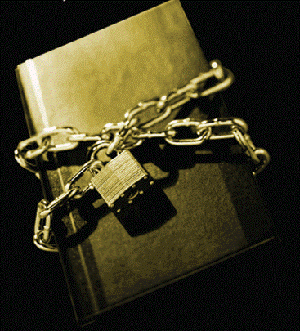An Author’s Reflections on Banned Books Week
Daniel Schwabauer
Today marks the end of the 2009 Banned Books Week. Call me jaded, but I can’t help seeing this as a massive publicity stunt cooked up by publishers and librarians in order to promote reading. Not that I blame them. In a society where every person is bombarded constantly by extreme messages from every conceivable perspective, it probably takes something like Banned Books Week to remind us of the importance of reading, to say nothing of the importance of free speech and the freedom of the press.
But I find it hard to take seriously the idea of books being banned in the United States. Sure, we have a few intolerant cranks here and there. What we don’t have is a trend, a movement of Fahrenheit 451 anti-book infidels.
Or do we?
First, it’s worth pointing out that “book banning” is, in reality, a fantastically inclusive term. A book can make it onto the Banned Books list if a couple of people per state mention concern about it to a librarian. An “Expression of Concern,” according to the American Library Association, is “an inquiry that has judgmental overtones.” And Inquiries with Judgmental Overtones, almost unbelievably, can be reported to the ALA’s Office of Intellectual Freedom. (Yep, in the interest of free speech, expressions of free speech are reported. Go figure.) These reports are then compiled into a confidential database and published in the Banned Books Week Resource Guide. (Yep, there is a Resource Guide for Banned Books Week.)
Don’t get me wrong. I’m not coming to the defense of pitchfork wielding nut cases bent on burning down their local libraries—if indeed such people exist. I’m not even coming to the defense of people with Judgmental Overtones. I’m just wondering who cares enough to censor—of all things—books?
When kids are given condoms in school; when they’re afforded access to public computers, Internet pornography, sexually graphic movies, reality television, cage fighting, and, well, you name it; when they’re exposed to a veritable fountain of media stimulation 24/7; who cares about some random young adult novel that might happen to depict the violent rape of a young girl? (Yep, it’s out there.)
Okay, so maybe some books cross the invisible line of acceptability. According to the ALA, most objections about books are expressed by parents who have a natural and constitutionally protected right to protect their children from the constant stream of yuck that flows through our culture. Still, who are we to judge?
But we do judge. We apparently do think that some books should be banned.
Don’t believe me?
Consider the Bible, conspicuously absent from Wikipedia’s and the ALA’s lists of banned books. We don’t hear much about Bible banning in the U.S., mostly because it’s only banned in places like schools. But no book is more likely to draw the ire of communist dictators, who historically have used more than Judgmental Overtones to enforce censorship.
More importantly, you don’t have to live in China or North Korea to see the influence of what might be called the Okay to be Banned Books List.
Take the One Year Adventure Novel. In the interest of fairness, I must stress that banning and OYAN have only slightly more in common than do banning and Expressions of Concern. OYAN has not really been banned anywhere, but it has raised eyebrows and elicited Judgmental Overtones. Why? Because in it I mention a handful of stories from the Bible as excellent examples of storytelling. So far no one has Expressed Concern about my mentioning Buddha or The Lord of the Rings. No one has mentioned my inclusion of Huck Finn, The Blood Ship, Zenda, Holes, The Book of Sorrows, A Christmas Carol, Tarzan, The Land that Time Forgot, Black Rock, or any of the other stories used in the curriculum. But teachers and administrators alike have told me that merely mentioning the Bible is a red flag. The context in which it is mentioned doesn’t really matter. It doesn’t matter if the content is informative and true. It doesn’t even matter if the curriculum works. It only matters that the Bible is mentioned.
Just as close to home is the case of Runt the Brave. The book sold well to school libraries when it was first released. No one seemed to have any problems with it until a school principal read a review with Judgmental Overtones that indicated RTB might be based loosely on the story of David & Goliath, which of course is from the Bible. The principal told the school librarian that she could not have students read Runt the Brave because someone might Express Concern.
No doubt these experiences color my thinking, for I have very mixed emotions regarding Banned Books Week. On one hand, the ALA is calling attention to the importance of reading, and quite possibly building a shield wall against any unlikely future tendency towards national censorship. On the other hand, our culture has already accepted national censorship, against which the ALA’s Banned Books Week is merely a Maginot Line.
As human beings we constantly make value judgments about what is acceptable and what isn’t. One person finds graphic depictions of child rape offensive; another finds a novel loosely based on a Bible story offensive.
Strange that the hammer of intolerance comes down on the latter and not the former. Strange that these concerns can’t, at worst, be treated equally.
I wonder why.




It is not censorship to have government officials (especially those in charge of educating children) stick to the secular matter of education. They should never appear to be endorsing religion. That’s in the First Amendment of the Constitution.
If mere mentions have become too controversial, it’s only because of past abuses of educator authority where the Bible was actually pushed rather than just mentioned. Non-Christian parents have the right to have their kids educated in public schools without their teachers indoctrinating them in a faith not their own. Don’t forget this, because Christian parents have the same right, and wouldn’t appreciate other religions’ holy books being presented to their kids at school without their consent.
There’s a place for that, and it happens to be anywhere you, the parents, want – except for under government jurisdiction. You can’t have public schools teach your religion to your kids (and all the other kids), that’s not what schools are for.
The Bible (and other religious books) may have historical significance that may be useful in a person’s education, but we’re still figuring out how to do it in a fair and purely educational way. Evangelical zeal and Christian dominance in the U.S. are thorny problems in this matter, and are what have made it so touchy.
Thanks for your reply, Lili.
I appreciate your thoughts, which illustrate my reason for writing the post. Nowhere did I complain about government authorities sticking to education. My post was about a double standard used by authorities to ban some books but not others. You are inferring religious content, which is exactly the problem.
Runt the Brave never even mentions the Bible. But if we were to remove every book that did, we’d have to ban thousands of books from school libraries, including the works of Shakespeare, Darwin, Lewis, Bradbury, Hawthorne, Poe and Martin Luther King, Jr.
To say that “it’s only because of past abuses” is to excuse bad behavior with bad behavior. Is it okay to apply this same logic to a book about, say, homosexuality? (“If it’s too controversial, it’s only because of past abuses by homosexuals.”) What about other books with religious implications? Shall we ban Origin of Species? (“If it’s too controversial, it’s only because of past abuses by Hitler, Stalin and Mao.”)
To imply that the only usefulness a text can have in education is its historical significance is tremendously limiting. What about using the Bible as a basis for understanding story structure, or poetry, or culture?
I wonder why the “thorny problems” of this issue are all on one side. Is evangelical zeal really worse than anti-evangelical zeal? Is there any other social group in the U.S. that would not resent your last sentence? (Try saying, “Gay activism and Jewish dominance in the U.S. are thorny problems in this matter, and are what have made it so touchy.”) Judgmental overtones?
If we’re going to say that it’s okay to ban the bible, or Runt the Brave, or OYAN, or any other book, we should at least put these books on the list. The list should include books that have actually been banned, not just books that have been scowled at.
Otherwise we should call it, “Disliked Books Week.”